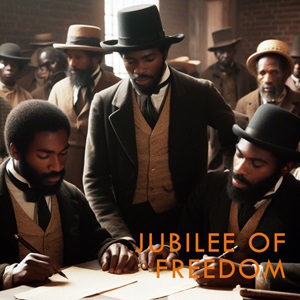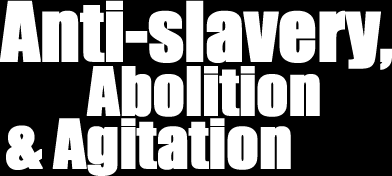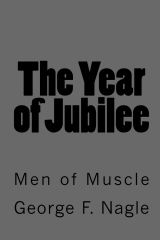 Enslavement
Enslavementto
freedom


Study Areas
A Jubilee of Freedom:
Harrisburg's African American Population
Hails the Emancipation Proclamation
The following article appeared in the Harrisburg Evening Telegraph on Wednesday, January 16, 1863. Harrisburg's Black community hailed Abraham Lincoln's Emancipation Proclamation as opening "a new era in our country's history," noting that "the American flag is now a true emblem of liberty." Such words hint at the ambivalence then felt by many African Americans for traditional patriotic symbols in the era of slavery, and reinforce the importance to Blacks of Lincoln's document as the first legal step toward elimination of "that crime against God."
The importance of the African American church to such political activities is easily seen in the use of Bethel A.M.E. Church on Short Street, in the Tanner's Alley neighborhood, as the location of the meeting. As noted in the article, the meeting began with prayer and the church choir participated. Discussion over the committee's proposed resolutions regarding the Emancipation Proclamation was conducted by three laymen and three ministers.
Notice that the third resolution reaffirms the eagerness of local Black men to fight alongside white soldiers, "if called upon." That chance would come barely two months later as a group of Black men departed Harrisburg for Massachusetts to enlist in the 54th regiment. On June 9th and 10th, two more groups, the second led by T. Morris Chester, left to enlist in the 55th Massachusetts.
Harrisburg Blacks also recognized that the Emancipation Proclamation was a political move designed to aid the war effort, and not a sudden change of heart regarding slavery on the part of the administration. Yet in it they foresaw the eventual demise of American slavery, and perhaps more importantly, it gave them a new resolve to carry on the war effort
A Jubilee of Freedom
Pursuant to notice a public meeting was held by the colored citizens of Harrisburg in the Methodist church, (Bethel,) on Tuesday evening, the 15th inst., to take into consideration the Proclamation of Freedom made on the 1st of January, 1863.
On motion, Mr. J. H. Dickison was called to the chair. Messrs. Z. Johnson, S. M. Bennet and the Rev. Mifflin Gibbs were appointed Vice Presidents, and John Wolf and H. Jones were appointed Secretaries.
An appropriate and fervent prayer was offered by the Rev. M. Gibbs, after which the choir, together with the whole congregation, united in singing the "Year of Jubilee has come."
The Proclamation being read, on motion of Mr. Gibbs, Messrs. John Wolf, S. M. Bennet and the Rev. David Stephens were appointed to draft a preamble and resolution that would express the sentiment of the meeting.
The committee reported the following resolutions, which were discussed by the Revs. M. Gibbs, D. Stephens, S. T. Jones and by Messrs. J. H. Dickison, T. Early, C. H. Vance and T. W. Brown, after which they were unanimously adopted.
WHEREAS, Abraham Lincoln, President of the United States of America, did, on the 1st day of January, 1863, issue a Proclamation that those states or parts of states that were resisting the lawful authority of the Government of the United States, that their slaves should be freed on the 1st of January, 1863, therefore;
Resolved, That we, the colored citizens of the city of Harrisburg, hail the 1st day of January, 1863, as a new era in our country's history--a day in which injustice and oppression were forced to flee and cower before the benign principles of justice and righteousness--a day in which the Goddess of Liberty, decked with the jewels of justice, presented to the sable sons and daughters of the south the inestimable boon of
liberty--a day from which the enfranchised will be able to look forward into the future with the full assurance that they will be able to sit down under their own "vine and fig tree, with none to molest them or make them afraid."
Resolved, That if our wishes had been consulted we would have preferred that the proclamation should have been general instead of partial; but we can only say to our brethren of the "border States," be of good cheer--the day of your deliverance draweth nigh--do not act contrary to the rules of propriety and good citizenship, for the rod of your oppressors will eventually be smitten by the omnipotence of truth--the "ark" of liberty will yet dwell within your borders and rest within your gates--the fires of freedom shall light your hill tops, and your valleys shall be made vocal with the songs of liberty.
Resolved, That the American flag is now a true emblem of liberty; and if called upon we feel bound as citizens to maintain its supremacy o'er land and sea, against foreign foes or domestic traitors.
Resolved, That we are well aware that freedom and citizenship are attended with responsibilities; and that the success or failure of the proclamation depend entirely upon ourselves, as public sentiment will be influenced for or against that righteous decree by our correct deportment and moral standing in the community.
Resolved, That although
the proclamation was not made as an act of philanthropy, or as a grand
deed of justice due to those suffering in bonds, but simply as a war
measure, still in it we recognize the hand of God; and for it we are
constrained to say, roll forward the day when the American soil shall
no more be polluted with that crime against God, American slavery;
but all will be able to say "Glory to God in the highest, on earth
peace and good will to man."
JOHN WOLF,
H. JONES,
Secretaries.
Further Reading
See page 4 of Lincoln Centennial Postcards for two popular culture images of Lincoln's role as emancipator.
Editor's Note
Thank you to David Pettigrew who tracked down the original 1863 edition of the Evening Telegraph to confirm this article. I had incorrectly attributed it to the January 18, 1863 edition of the Harrisburg Daily Telegraph. David notes: "Michael Lear and Jesse Noonan of the State Library showed me the original Harrisburg Daily Telegraph, and Evening Telegraph news issues from January 2 and January 16, 1863, respectively. The January 2 edition of Harrisburg Daily Telegraph publishes a local report of the emancipation proclamation, while the January 16 issue of Evening Telegraph publishes the local African American response under a title 'Jubilee of Freedom.' " (Email, David Pettigrew to George Nagle, 27 February 2024).
Did You Know?
The tradition of "Watch Night" in the African American church, celebrated on New Years' Eve, honors the original "Freedom's Eve," December 31, 1862, when Blacks gathered to celebrate the emancipation of slaves by President Lincoln's Proclamation. Watch Night is still celebrated in Harrisburg, and in many African American churches across the nation.
 Covering the history of African Americans in central Pennsylvania from the colonial era through the Civil War.
Covering the history of African Americans in central Pennsylvania from the colonial era through the Civil War.
Support the Afrolumens Project. Purchase the books on Amazon:
The Year of Jubilee, Volume One: Men of God
Volume Two: Men of Muscle